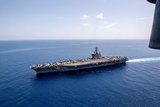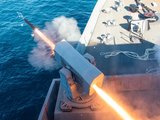Ford-class carriers still struggle to hit design targets, says DOT&E
USS Gerald R. Ford (CVN 78) successfully completed the second of three scheduled explosive events for Full Ship Shock Trials (FSST) on 16 July 2021. (Photo: USN)
The results of a Full-Ship Shock Trial for the USN aircraft carrier Gerald R. Ford (CVN 78) revealed 'several' design shortfalls, according to the FY2021 annual report from the Director Operational Test & Evaluation (DOT&E) in the DoD.
The report notes that issues arising from the FSST were not previously discovered by modelling and simulation or component-level testing, adding that addressing the shortfalls could improve the Ford-class carriers' survivability against underwater threats.
The DOT&E report said that while shock trial data analysis is still ongoing, the USN had already identified several survivability improvements.
The USN conducted an FSST on USS Gerald R.
Already have an account? Log in
Want to keep reading this article?
More from Naval Warfare
-
![RTX Raytheon targets nearly 170% RAM production increase to meet global demand]()
RTX Raytheon targets nearly 170% RAM production increase to meet global demand
The US multinational company is currently assembling 300 Rolling Airframe Missile rounds per year, with plans to reach 800 units annually after significant investment and modernisation of its facilities.
-
![Raytheon will develop an advanced naval sensing and targeting system for DARPA]()
Raytheon will develop an advanced naval sensing and targeting system for DARPA
RTX’s solution for DARPA’s Pulling Guard programme is intended to provide advanced maritime defence technologies to protect platforms against uncrewed surface vehicles and other threats.
-
![Spain’s F100 upgrade mirrors Aegis modernisation paths in allied navies]()
Spain’s F100 upgrade mirrors Aegis modernisation paths in allied navies
The Spanish Navy’s Alvaro de Bazan-class of air defence frigates will receive the latest Aegis Weapon System technology among other modernisations to extend the service life to 2045.
-
![UK’s Fleet Solid Support ship programme deemed on track despite steel supply concerns]()
UK’s Fleet Solid Support ship programme deemed on track despite steel supply concerns
Shipbuilders are saying the programme is going ahead on time as the government estimates 7.7 million tonnes of steel are needed for 2026 infrastructure projects.
-
![Raytheon unveils details of its proposal for the US Navy/NATO ESSM Next Significant Variant]()
Raytheon unveils details of its proposal for the US Navy/NATO ESSM Next Significant Variant
In an exclusive interview with Shephard, Raytheon’s VP of Shipboard Missiles disclosed what improvements the company plans to offer for the Sea Sparrow NSV.






















